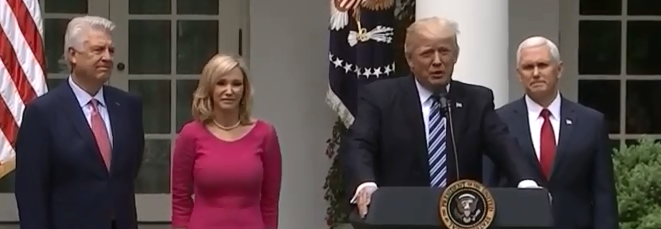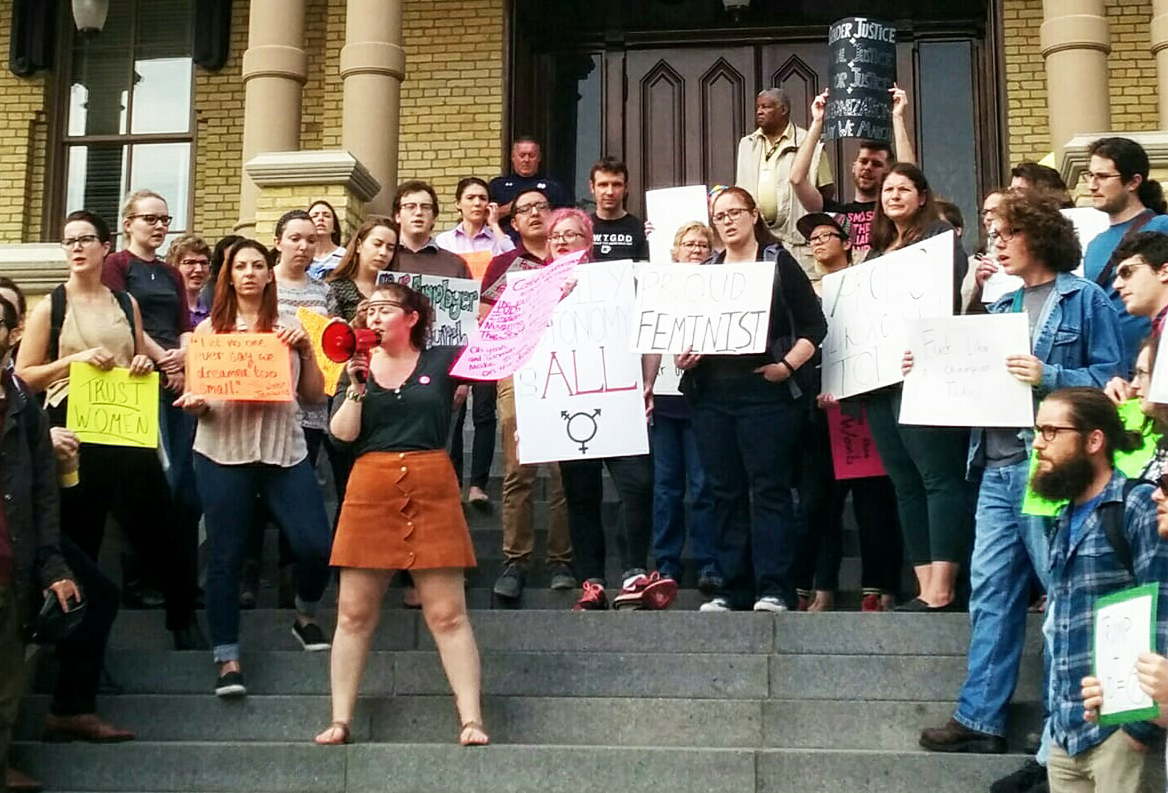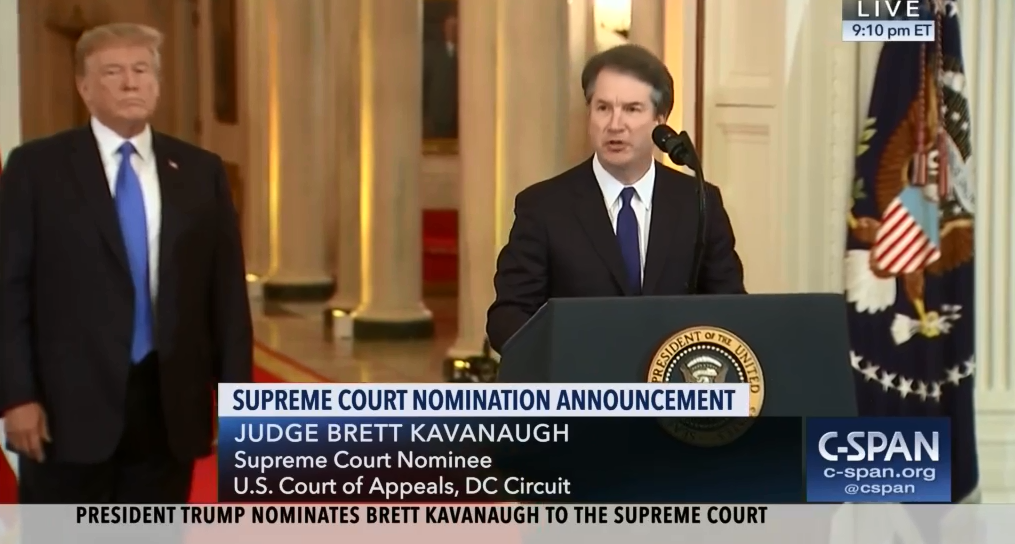Religious freedom has been under constant threat by the Trump-Pence administration, which continues to chip away at the separation of church and state.
President Donald Trump’s inauguration on Jan. 20, 2017, set the tone by including prayers and speeches by six religious leaders, most conservative Christians. Since then, Trump has aggressively pandered to the Religious Right, which has a far-reaching agenda to reshape American law according to its narrow worldview.
While conducting research about the influence of Trump’s Evangelical Advisory Board, Americans United built a timeline of administration attacks on church-state separation. The version being published here is condensed, but a full, interactive version can be viewed at AU’s website.
Jan. 27, 2017: Trump issued the first Muslim ban, temporarily blocking from the United States immigrants and travelers from seven predominantly Muslim countries and refugees from all countries.

(Photo: Iranian-American Safoura Kashfipour protests Trump’s Muslim ban.)
Jan. 31, 2017: Trump nominated Neil Gorsuch to the U.S. Supreme Court seat left vacant by the death of Justice Antonin Scalia. Like Scalia, Gorsuch has exhibited hostility to church-state separation. Gorsuch was sworn in on April 10, 2017.
Feb. 2, 2017: During his address at the annual National Prayer Breakfast, Trump vowed to “get rid of and totally destroy the Johnson Amendment,” a federal law that protects the integrity of our elections and tax-exempt organizations, including houses of worship, by ensuring the nonprofits do not endorse or oppose political candidates.
Feb. 7, 2017: Betsy DeVos, a political operative with a deep history of advocating for private school vouchers but with no relevant educational experience, was confirmed as Trump’s secretary of education. In its 2018 and 2019 fiscal year budgets, DeVos and Trump proposed slashing the Department of Education’s budget and diverting $1 billion of taxpayer money to fund private school vouchers and related schemes.
Feb. 8, 2017: Sen. Jeff Sessions (R-Ala.), a longtime foe of church-state separation, was confirmed as Trump’s attorney general. During his tenure so far, Sessions has continued to threaten religious freedom by issuing Department of Justice (DOJ) guidance that would allow religion to be used to discriminate, by creating the Religious Liberty Task Force to execute the guidance and through other actions.
Feb. 28, 2017: During his first Joint Address to Congress, Trump touted his misguided idea of funneling public money into the coffers of private schools. While on the campaign trail, Trump had promised to divert $20 billion from public education to pay for voucher schemes.
March 6, 2017: A month after the first Muslim ban was stopped in federal court, Trump issued a new executive order that still temporarily barred immigrants from six Muslim-majority countries.
May 4, 2017: During a National Day of Prayer ceremony at the White House with religious leaders, Trump signed a “religious freedom” executive order aimed at laying the groundwork for obstructing women’s access to birth control, limiting enforcement of the Johnson Amendment and changing government rules in ways that could permit discrimination against LGBTQ people, women, religious minorities and almost anyone else.

(Photo: Evangelicals Jack Graham and Paula White stand with President Donald Trump and Vice President Mike Pence during a Rose Garden ceremony on the National Day of Prayer in May 2017. Credit: Screenshot from C-SPAN.)
July 10, 2017: During his presidential campaign, Trump formed an Evangelical Advisory Board that he has continued to rely upon for policy advice and that continues to meet regularly with administration officials. On July 10, for example, board members attended an all-day meeting at the White House to discuss topics ranging from health care and judicial nominees to foreign policy and religious liberty. The meeting included an Oval Office prayer service with Trump and Pence. (See “All The President’s Men And Women” in this issue of Church & State for more on AU’s demand that this advisory board begin following federal transparency laws or disband.)
Sept. 25, 2017: As parts of Muslim Ban 2.0 were expiring, Trump issued Muslim Ban 3.0 to extend the ban on people from six Muslim-majority countries. In a 5-4 decision, the Supreme Court in June 2018 allowed Muslim Ban 3.0 to remain in place indefinitely.
Sept. 27, 2017: The U.S. Department of Health and Human Services (HHS) released its draft strategic plan for 2018-2022, which included several troubling proposals, including apparent plans to allow taxpayer-funded contractors and grantees to claim the right to use religion to decide whom they will serve and which services they will provide.
Oct. 6, 2017: The Trump administration released new regulations to create a sweeping religious exemption to the Affordable Care Act (ACA) birth control benefit: They would allow any employer or university to use religion to deny their employees and students coverage for birth control. The rules have been blocked by federal courts from going into effect.
Oct. 6, 2017: Sessions issued guidance for all federal agencies in response to Trump’s May “religious freedom” executive order. The guidance serves as a blueprint for using religion to discriminate, especially against women, LGBTQ people and religious minorities.
Oct. 12, 2017: DeVos’ Department of Education released its draft strategic plan that prioritizes using public dollars to fund predominately religious schools, which fail to provide students with better educational outcomes, deny students civil rights and constitutional protections, and lack accountability to taxpayers.
Oct. 13, 2017: In response to the new birth control regulations issued a week earlier, the Trump administration entered into an illegal, back-room deal with the University of Notre Dame that purports to give the university the right to violate the ACA and not provide insurance coverage for contraception.

(Photo: University of Notre Dame students protest the university’s plan to deny students and employees access to birth control coverage. Credit: Irish 4 Reproductive Health)
Oct. 25, 2017: HHS issued a request for information on ways it can let faith-based organizations use religion to harm others. Premised as figuring out how to remove “barriers” HHS claims faith-based organizations face when seeking taxpayer funding, the request is a step toward implement DOJ’s discriminatory guidance on “religious freedom.”
Jan. 3, 2018: The Federal Emergency Management Agency (FEMA) announced that it changed longstanding policy in order to allow the government to use taxpayer money to rebuild houses of worship damaged in disasters. The Constitution bars the government from building houses of worship in order to protect taxpayers from being forced to fund a religion with which they may disagree. It also protects houses of worship from becoming entwined with the government. The new FEMA policy ignores these dangers.
Jan. 19, 2018: HHS proposed a new regulation that could allow hospitals, insurance plans, health care providers and even those tangentially involved like staff who schedule procedures to use religious beliefs to turn away patients in need of care, even lifesaving procedures. This threatens the health of countless Americans, especially women and LGBTQ people. The day before, HHS created a new Conscience and Religious Freedom Division of the Office for Civil Rights to enforce this sweeping new regulation.
April 26, 2018: The Senate confirmed Trump nominee Mike Pompeo to be secretary of state. With his record of anti-Muslim rhetoric and hostility toward the LGBTQ community, women, refugees and others, Pompeo is a poor choice to represent to the world American ideals of religious freedom and equality.
May 3, 2018: During his second National Day of Prayer while in office, Trump signed an executive order to establish the White House Faith and Opportunity Initiative that further entrenches the administration’s policies to allow religion to discriminate. At the same time, it strips the limited religious liberty protections that exist for individuals who use government-funded social services.
June 14, 2018: Sessions quoted a Bible verse to defend his department’s policy of prosecuting everyone who crosses the border from Mexico: “I would cite you to the Apostle Paul and his clear and wise command in Romans 13, to obey the laws of the government because God has ordained the government for his purposes.”
July 9, 2018: Trump nominated Brett Kavanaugh to replace retiring Justice Anthony Kennedy on the U.S. Supreme Court. Kavanaugh has a hostile record toward church-state separation: he has supported school-sponsored prayer, private school vouchers, government funding for religious activities and allowing religion to be used to discriminate against employees.

(Photo: President Donald Trump’s Supreme Court nominee Brett Kavanaugh. Credit: Screenshot from C-SPAN.)
July 30, 2018: During a summit on religious liberty, Sessions announced the creation of a Religious Liberty Task Force that would work to implement the DOJ guidance he unveiled in October 2017 that serves as a blueprint for using religion to discriminate, particularly against women and LGBTQ people.
Aug. 10, 2018: The Department of Labor’s Office of Federal Contract Compliance Programs Directive issued a new directive that will make it easier for faith-based federal contractors to use religion to justify employment discrimination, especially against women and LGBTQ workers.


